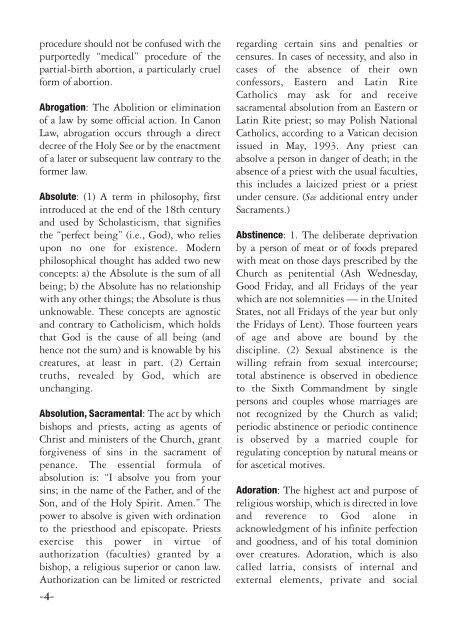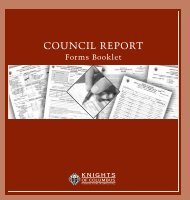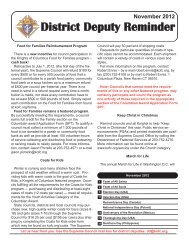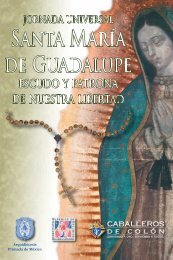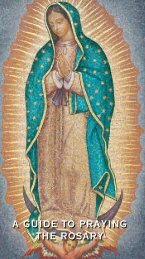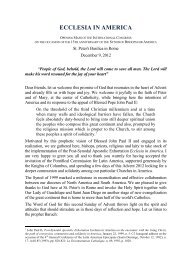CATHOLIC WORD BOOK - Knights of Columbus, Supreme Council
CATHOLIC WORD BOOK - Knights of Columbus, Supreme Council
CATHOLIC WORD BOOK - Knights of Columbus, Supreme Council
Create successful ePaper yourself
Turn your PDF publications into a flip-book with our unique Google optimized e-Paper software.
procedure should not be confused with the<br />
purportedly “medical” procedure <strong>of</strong> the<br />
partial-birth abortion, a particularly cruel<br />
form <strong>of</strong> abortion.<br />
Abrogation: The Abolition or elimination<br />
<strong>of</strong> a law by some <strong>of</strong>ficial action. In Canon<br />
Law, abrogation occurs through a direct<br />
decree <strong>of</strong> the Holy See or by the enactment<br />
<strong>of</strong> a later or subsequent law contrary to the<br />
former law.<br />
Absolute: (1) A term in philosophy, first<br />
introduced at the end <strong>of</strong> the 18th century<br />
and used by Scholasticism, that signifies<br />
the “perfect being” (i.e., God), who relies<br />
upon no one for existence. Modern<br />
philosophical thought has added two new<br />
concepts: a) the Absolute is the sum <strong>of</strong> all<br />
being; b) the Absolute has no relationship<br />
with any other things; the Absolute is thus<br />
unknowable. These concepts are agnostic<br />
and contrary to Catholicism, which holds<br />
that God is the cause <strong>of</strong> all being (and<br />
hence not the sum) and is knowable by his<br />
creatures, at least in part. (2) Certain<br />
truths, revealed by God, which are<br />
unchanging.<br />
Absolution, Sacramental: The act by which<br />
bishops and priests, acting as agents <strong>of</strong><br />
Christ and ministers <strong>of</strong> the Church, grant<br />
forgiveness <strong>of</strong> sins in the sacrament <strong>of</strong><br />
penance. The essential formula <strong>of</strong><br />
absolution is: “I absolve you from your<br />
sins; in the name <strong>of</strong> the Father, and <strong>of</strong> the<br />
Son, and <strong>of</strong> the Holy Spirit. Amen.” The<br />
power to absolve is given with ordination<br />
to the priesthood and episcopate. Priests<br />
exercise this power in virtue <strong>of</strong><br />
authorization (faculties) granted by a<br />
bishop, a religious superior or canon law.<br />
Authorization can be limited or restricted<br />
-4-<br />
regarding certain sins and penalties or<br />
censures. In cases <strong>of</strong> necessity, and also in<br />
cases <strong>of</strong> the absence <strong>of</strong> their own<br />
confessors, Eastern and Latin Rite<br />
Catholics may ask for and receive<br />
sacramental absolution from an Eastern or<br />
Latin Rite priest; so may Polish National<br />
Catholics, according to a Vatican decision<br />
issued in May, 1993. Any priest can<br />
absolve a person in danger <strong>of</strong> death; in the<br />
absence <strong>of</strong> a priest with the usual faculties,<br />
this includes a laicized priest or a priest<br />
under censure. (See additional entry under<br />
Sacraments.)<br />
Abstinence: 1. The deliberate deprivation<br />
by a person <strong>of</strong> meat or <strong>of</strong> foods prepared<br />
with meat on those days prescribed by the<br />
Church as penitential (Ash Wednesday,<br />
Good Friday, and all Fridays <strong>of</strong> the year<br />
which are not solemnities — in the United<br />
States, not all Fridays <strong>of</strong> the year but only<br />
the Fridays <strong>of</strong> Lent). Those fourteen years<br />
<strong>of</strong> age and above are bound by the<br />
discipline. (2) Sexual abstinence is the<br />
willing refrain from sexual intercourse;<br />
total abstinence is observed in obedience<br />
to the Sixth Commandment by single<br />
persons and couples whose marriages are<br />
not recognized by the Church as valid;<br />
periodic abstinence or periodic continence<br />
is observed by a married couple for<br />
regulating conception by natural means or<br />
for ascetical motives.<br />
Adoration: The highest act and purpose <strong>of</strong><br />
religious worship, which is directed in love<br />
and reverence to God alone in<br />
acknowledgment <strong>of</strong> his infinite perfection<br />
and goodness, and <strong>of</strong> his total dominion<br />
over creatures. Adoration, which is also<br />
called latria, consists <strong>of</strong> internal and<br />
external elements, private and social


